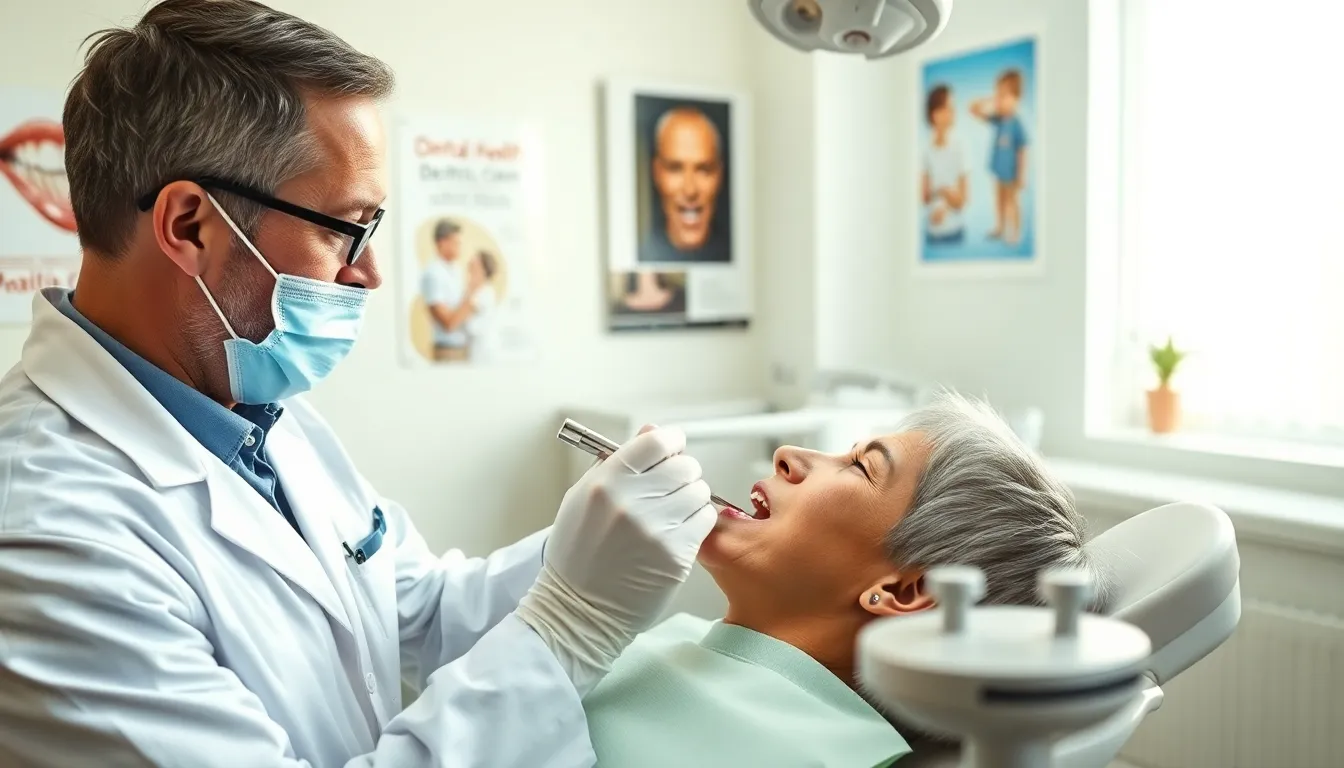Cancer treatments like chemotherapy can make your mouth very sensitive. Keeping your teeth and gums healthy is extra important when you’re having chemo, as even small dental problems can become serious when your body’s fighting abilities are lower. Many people wonder if it’s safe to visit the dentist during cancer treatment, and with proper planning, it usually is.
Visit dentistarmidale.com.au to learn more about special dental care during chemotherapy. Our experienced team works closely with your cancer specialists to provide safe, comfortable treatment at the right time during your treatment journey.
Understanding Chemotherapy and Its Impact on Oral Health
Chemotherapy affects oral health by lowering white blood cell counts, increasing infection risk in the mouth. Cytotoxic drugs cause mucositis, which manifests as soreness, ulcers, and inflammation in the oral cavity. Xerostomia, or dry mouth, results when chemotherapy disrupts salivary gland function, making it harder to swallow and speak. Gum tissues may bleed easily due to suppressed platelet production, raising the risk of periodontal disease. Taste changes, including metallic or bitter flavours, often occur with commonly used chemotherapy agents such as 5-fluorouracil and methotrexate. Frequent fungal or bacterial infections in the mouth arise because the immune response is compromised during treatment.
Dental sensitivity, bone loss, and slow wound healing can emerge with prolonged chemotherapy therapy. Increased dental caries develop as a consequence of both xerostomia and impaired remineralisation. Oral complications can interrupt chemotherapy schedules if left unmanaged, with research from Cancer Research UK indicating up to 40% of patients experience significant mouth problems during cycles of chemotherapy. Co-ordination between oncologists and dental professionals optimises oral care and reduces treatment-associated morbidities.
Common Dental Issues Faced During Chemotherapy

Mucositis affects up to 40% of chemotherapy patients, causing painful ulceration and inflammation of oral mucosa. This condition increases infection risk and often reduces nutritional intake due to discomfort.
Opportunistic infections frequently arise when immune defences are suppressed. Patients often develop oral candidiasis, herpes simplex reactivation, or other viral and fungal infections.
Salivary gland dysfunction commonly leads to xerostomia, increasing the risk of dental caries and oral discomfort. Reduced saliva flow supports bacterial growth and hinders natural cleaning mechanisms.
Taste changes are reported by many undergoing chemotherapy, altering food preferences and appetite. These sensory modifications may lead to further nutritional compromise.
Gingival bleeding and poor wound healing typically result from thrombocytopenia and impaired immune response. Even gentle brushing can trigger bleeding, and post-surgical healing times may lengthen compared with healthy individuals.
| Dental Issue | Prevalence/Effect | Example |
|---|---|---|
| Mucositis | Up to 40% experience; severe pain, ulceration | Chemotherapy-associated mouth sores |
| Opportunistic infections | Increased risk under immunosuppression | Oral thrush, recurrent herpes labialis |
| Salivary gland dysfunction | Common; reduced saliva, increased caries | Persistent dry mouth, rapid tooth decay |
| Taste changes | Reported by many; impacts food preference | Metallic taste, loss of flavour |
| Bleeding and poor healing | Frequently observed with low platelets | Prolonged bleeding after dental cleaning |
Assessing the Risks: Can You Have Dental Treatment While on Chemotherapy
Dental treatment during chemotherapy is possible in certain situations, although increased infection and bleeding risks limit available options. Careful assessment and collaboration between medical and dental teams reduces complications and supports recovery.
Factors Influencing Dental Treatment Decisions
Several factors determine the timing and appropriateness of dental procedures for patients receiving chemotherapy:
- Blood Cell Counts: Reduced white blood cell counts and thrombocytopenia commonly occur during chemotherapy, increasing the risk of infection and uncontrolled bleeding after dental procedures (NHS, [2]).
- Oral Health Status: Active oral infections or inflammation such as periodontal disease or mucositis can worsen with immunosuppression (Cancer Research UK, [5]).
- Type of Dental Procedure: Non-invasive interventions such as scaling or simple fillings present lower risks than extractions or surgical treatments, which providers usually defer unless urgent.
- Medical Team Coordination: Treatment is safest when oncologists and dentists communicate directly, considering blood test results and treatment cycles when scheduling; this approach enables appropriate timing, usually before the next chemotherapy cycle, once blood counts have recovered.
Types of Dental Treatments Considered Safe
Dental professionals select procedures based on patient stability and medical recommendations:
- Preventive Care: Cleanings, fluoride varnishes and oral hygiene guidance are regularly advised to prevent infection and support oral health, provided the patient’s cell counts are stable ([3][5]).
- Emergency Care: Urgent procedures such as draining abscesses or treating acute dental pain take priority, with enhanced precautions and input from the oncology team.
- Supportive Therapies: Fluoride gels, custom mouth rinses and recommendations for managing xerostomia commonly protect teeth and mucosa during chemotherapy, reducing discomfort and minimising caries risk.
| Key Considerations | Recommendations |
|---|---|
| Blood cell and platelet counts | Defer non-urgent treatment when counts are low |
| Existing oral infections | Treat before or between cycles if possible |
| Type of intervention | Prefer non-invasive, delay invasive when possible |
| Team communication | Schedule with oncologist input and regular updates |
Proactive planning mitigates risks and helps patients maintain oral health throughout chemotherapy.
Working with Your Oncology and Dental Teams
Coordinated care between oncology and dental professionals forms a critical part of managing dental treatment safely during chemotherapy. Collaboration enables risk assessment and helps determine the optimal timing for dental interventions.
Communication Between Healthcare Providers
Regular communication between the dental and oncology teams supports safe decision-making. Dentists consult the patient’s oncology or haematology team to access current blood counts and overall health information before any procedure. This liaison determines treatment safety and whether antibiotic prophylaxis is required, particularly for patients with central venous catheters or implanted medical devices. Immediate updates about changes in medication, treatment cycles, or patient status ensure dental care remains suitable for the patient’s current condition.
Preparing for Dental Visits During Chemotherapy
Careful planning of dental visits during chemotherapy reduces complication risks. Appointments are typically scheduled after blood counts recover, with 7 to 10 days allowed for healing after any invasive procedure and before the next chemotherapy cycle. Strict, gentle oral hygiene, taught and reinforced by the dental team, helps minimise infection risks. Urgent conditions, such as dental abscesses or severe oral pain, prompt swift dental intervention following oncology team guidance, while non-urgent procedures remain deferred until chemotherapy concludes. Blood tests taken directly before planned dental treatments confirm adequate clotting and infection-fighting capacity, optimising both safety and oral health outcomes.
Tips for Maintaining Oral Health Throughout Chemotherapy
- Use Gentle Oral Hygiene Methods
Patients maintain oral health during chemotherapy by using a soft-bristled toothbrush, brushing twice daily, and choosing alcohol-free, mild toothpaste and mouthwashes. Gentle flossing reduces gum injury when platelet levels allow, according to Macmillan Cancer Support.
- Monitor and Manage Oral Symptoms
Patients identify issues early by inspecting their mouth daily for ulcers, redness, or swelling. Reporting symptoms such as mucositis or oral infections to both the oncology and dental teams enables prompt intervention.
- Optimise Hydration and Saliva Flow
Patients increase comfort by drinking water frequently and using sugar-free gum or lozenges to stimulate saliva if experiencing xerostomia, as NHS guidelines recommend. Limiting caffeinated or alcoholic drinks prevents further dryness.
- Follow Dietary Recommendations
Patients lower oral health risks by choosing non-acidic, soft foods, and avoiding sugary snacks, which helps prevent dental caries and reduces mouth irritation. Nutritionists may provide individual recommendations.
- Schedule Regular Professional Dental Checks
Patients benefit from routine dental inspections and hygiene appointments, ideally scheduled between chemotherapy cycles when blood counts are stable, as advised by Cancer Research UK. Dentists provide guidance tailored to the patient’s treatment phase.
- Communicate with Healthcare Teams
Patients coordinate with the oncology and dental team before undergoing any oral care procedures. Dentists request blood work results (especially white blood cells and platelets) within 48 hours prior to planned treatment.
- Manage Plaque and Infection Risks
Patients consistently remove plaque by adhering to daily oral hygiene routines and promptly addressing any signs of infection or bleeding. Professional cleanings, as permitted, support ongoing oral health.
- Apply Moisturising Products When Needed
Patients use saliva substitutes or gels to relieve dry mouth symptoms, following recommendations from healthcare professionals, especially when xerostomia severely affects eating or speech.
| Strategy | Purpose | Example |
|---|---|---|
| Gentle brushing & flossing | Reduce injury, maintain hygiene | Soft-bristled brush, alcohol-free mouthwash |
| Symptom monitoring | Detect complications early | Check for ulcers, swelling, or bleeding |
| Saliva stimulation and hydration | Relieve/prevent dry mouth | Sugar-free gum, frequent water intake |
| Dietary adjustments | Prevent caries and mouth soreness | Soft, non-acidic food, limit sugary snacks |
| Scheduled dental checks | Support oral health, monitor complications | Appointments between chemotherapy cycles |
| Team communication | Ensure safe and appropriate care | Sharing recent blood counts pre-treatment |
| Plaque/infection control | Lower infection risk | Daily brushing, prompt reporting of oral changes |
| Moisturising products | Soothe xerostomia symptoms | Saliva substitutes, oral gels |
Conclusion
Dental treatment during chemotherapy is possible but requires careful planning and teamwork between medical and dental professionals. By staying proactive and following expert advice, patients can reduce the risks linked to oral health problems and improve their overall well-being. Regular communication with healthcare providers ensures that any dental care is both safe and effective, allowing patients to focus on their recovery with greater confidence.
Frequently Asked Questions
How does chemotherapy affect dental health?
Chemotherapy lowers white blood cell counts, making patients more susceptible to mouth infections, gum bleeding, and painful conditions like mucositis and dry mouth. These side effects can increase the risk of dental problems and complicate chemotherapy treatment if not managed promptly.
What are the most common oral problems during chemotherapy?
Common oral problems include mucositis (painful mouth ulcers), dry mouth (xerostomia), increased risk of dental caries, taste changes, gum bleeding, and oral infections such as thrush or herpes simplex reactivation.
Can I have dental treatment while undergoing chemotherapy?
Dental treatment is sometimes possible during chemotherapy but must be assessed carefully. Increased risks of bleeding and infections require close coordination between your dentist and oncologist, and treatment might be limited to urgent care based on your blood counts and health status.
Why is it important to coordinate care between my dentist and oncologist?
Coordinated care ensures that any dental procedures are safely planned around your chemotherapy schedule and blood counts, reducing the risk of complications. This teamwork helps prevent serious infections and manage your overall health during treatment.
What oral hygiene tips can help during chemotherapy?
Use a soft-bristled toothbrush and alcohol-free toothpaste, inspect your mouth daily for changes, stay hydrated, and chew sugar-free gum to promote saliva. Avoid sugary or acidic foods, and have regular dental check-ups between chemo cycles.
When should I see my dentist if I’m on chemotherapy?
Ideally, visit your dentist before starting chemotherapy and schedule routine check-ups between treatment cycles when your blood counts have recovered. Contact your dentist or oncologist if you notice mouth sores, bleeding, or signs of infection.
Is it safe to use mouthwash during chemotherapy?
Use only alcohol-free mouthwash to avoid irritation. Consult your dental professional or oncologist before adding any new oral care products to ensure they are safe during treatment.
How can I relieve dry mouth caused by chemotherapy?
Drink water frequently, use sugar-free gum or lozenges to stimulate saliva, and consider saliva substitutes or moisturising gels recommended by your dentist. Avoid caffeine and alcohol, which can worsen dryness.
